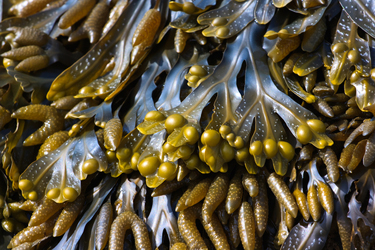Bladderwrack
Contents
Uses
- Bladderwrack is a type of seaweed. People use the whole plant to make medicine.
- Bladderwrack is used for many conditions, but, so far, there isn’t enough scientific evidence to determine whether or not it is effective for any of them. It’s also important to note that it’s not safe to take bladderwrack by mouth.
- Bladderwrack is used for thyroid disorders including underactive thyroid (myxedema), over-sized thyroid gland (goiter), and iodine deficiency. It is also used for obesity,arthritis, joint pain, “hardening of the arteries” (arteriosclerosis), digestive disorders,heartburn, “blood cleansing,” constipation, bronchitis, emphysema, urinary tract disorders, and anxiety. Other uses include boosting the immune system and increasing energy.
- Some people also apply bladderwrack to the skin for skin diseases, burns, aging skin, and insect bites.
- Don’t confuse bladderwrack with bladderwort.
Benefits
- Bladderwrack, like many sea plants, contains varying amounts of iodine, which is used to prevent or treat some thyroid disorders. Bladderwrack products may contain varying amounts of iodine, which makes it an inconsistent source of iodine. Bladderwrack also contains algin, which can act as a laxative to help the stool pass through the bowels.
Cautions
- Bladderwrack is POSSIBLY SAFE when applied to the skin. Bladderwrack isPOSSIBLY UNSAFE when taken by mouth. It may contain high concentrations of iodine, which could cause or worsen some thyroid problems. Prolonged, high intake of dietary iodine is linked with goiter and increased risk of thyroid cancer. Treatment of thyroid problems should not be attempted without medical supervision.
- Like other sea plants, bladderwrack can concentrate toxic heavy metals, such as arsenic, from the water in which it lives.
- Pregnancy and breast-feeding: Bladderwrack is LIKELY UNSAFE during pregnancy and breast-feeding. Don’t use it.
- Bleeding disorders: Bladderwrack might slow blood clotting. In theory, bladderwrack might increase the risk of bruising or bleeding in people with bleeding disorders.
- Infertility: Preliminary research suggests that taking bladderwrack might make it harder for women to get pregnant.
Iodine allergy: Bladderwrack contains significant amounts of iodine, which could cause an allergic reaction in sensitive people. Don’t use it.
- Surgery: Bladderwrack might slow blood clotting. There is a concern that it might cause extra bleeding during and after surgery. Stop taking bladderwrack at least 2 weeks before surgery.
- Thyroid problems known as hyperthyroidism (too much thyroid hormone), or hypothyroidism (too little thyroid hormone): Bladderwrack contains significant amounts of iodine, which might make hyperthyroidism and hypothyroidism worse. Don’t use it.
Interactions
Moderate Interaction Be cautious with this combination
- Medications for an overactive thyroid (Antithyroid drugs) interacts with BLADDERWRACK: Bladderwrack can contains significant amounts of iodine. Iodine can affect the thyroid. Taking iodine along with medications for an overactive thyroid might decrease the thyroid too much. Do not take bladderwrack if you are taking medications for an overactive thyroid.
- Some of these medications include methenamine mandelate (Methimazole), methimazole (Tapazole), potassium iodide (Thyro-Block), and others.
- Medications that slow blood clotting (Anticoagulant / Antiplatelet drugs) interacts with BLADDERWRACK: Bladderwrack might slow blood clotting. Taking bladderwrack along with medications that also slow clotting might increase the chances of bruising and bleeding.
- Some medications that slow blood clotting include aspirin, clopidogrel (Plavix), diclofenac (Voltaren, Cataflam, others), ibuprofen (Advil, Motrin, others), naproxen (Anaprox, Naprosyn, others), dalteparin (Fragmin), enoxaparin (Lovenox), heparin, warfarin (Coumadin), and others.
Other Names
Alga Noruega o Nudosa, Algue Laminaire, Ascophylle Noueuse, Ascophyllum nodosum, Atlantic Kelp, Black Tang, Bladder Fucus, Bladder Wrack, Blasentang, Chêne Marin, Cutweed, Fucus, Fucus Vésiculeux, Fucus vesiculosis, Goémon, Kelp, Kelpware, Kelp-Ware, Knotted Wrack, Laitue de Mer, Laitue Marine, Laminaire, Marine Oak, Meereiche, Norwegian Seaweed, Quercus Marina, Rockweed, Rockwrack, Schweintang, Sea Kelp, Seawrack, Tang, Varech, Varech Vésiculeux.
References
Source: WebMD, “Bladderwrack”, http://www.webmd.com/vitamins-supplements/


I was very thrilled to find this site on bing.I wanted to say thanks to you with regard to this wonderful post!! I definitelyappreciated every little bit of it and I’ve you bookmarked to have a look at new stuff you post.